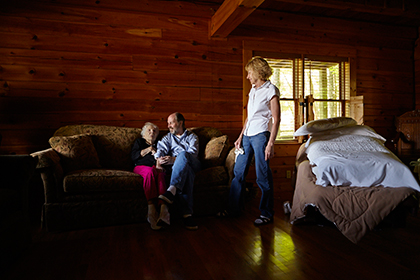AARP Hearing Center

By Hollie Deese • Paula Eisenberger, 59, of Mount Juliet, had no idea how hard being a full-time caregiver to her mother would be when she took on the responsibility eight years ago.If things had gone as planned, perhaps it would have been easier. But Katherine “Granny” Jarvis’ health rapidly declined.
The extent of care Jarvis, now 92, needed went far beyond administering her medication and preparing her meals. Both Eisenberger and her husband, Matthew Peters, 54, quit their jobs to become Jarvis’ full-time, at-home caregivers.
1.6 million caregivers
Eisenberger and Peters are among the more than 1.6 million Tennessee residents who provide care to an adult relative or friend. The AARP Public Policy Institute estimates the value of that unpaid care is $11 billion. AARP Tennessee has begun a project to identify the resources available to family caregivers in the state.
Among them is the Greater Nashville Area Agency on Aging and Disability (AAAD), which Eisenberger called after seeing a commercial for an Alzheimer’s and dementia support group just before Jarvis moved in eight years ago.
The intake worker “was unbelievably informative and very direct about what we were getting into,” Eisenberger said of her first contact with the Greater Nashville AAAD.
Tennessee’s nine AAADs provide caregiver services and referrals to agencies that offer services that help frail people remain at home or with relatives as long as possible—and help caregivers avoid burnout.
“So many caregivers feel like they are in it by themselves, and that is not true,” said Clara Kelly, the family caregiver specialist with the Greater Nashville AAAD.
Family or other informal caregivers can obtain services such as training, temporary respite care, light homemaking, minor home modification and delivered meals, as well as referrals to counseling and support groups from an AAAD. Most of the services are free to all, although some are based on ability to pay, and not all services are available in all regions.
Through the AAAD, Eisenberger learned she and her husband are eligible for free respite service four hours a week so they can run errands or get a break. Eisenberger and Peters also have formed a strong bond with the AAAD caseworker who visits with them for a few hours when she comes to check on them.
Kelly said it’s imperative to get help to caregivers as soon as they reach out, even if it is just to direct them to a support group or offer a sympathetic ear.
Online caregiving chat
“There are some amazing services being offered around Tennessee, but there is not a one-stop shop for people to find them,” said Karin Miller, AARP Tennessee associate state director of communications. She said AARP Tennessee is working with the governor’s office, other state officials and agencies that provide education or services to caregivers to address the lack of consolidated caregiving information available in the state.
AARP Tennessee is surveying members and volunteers about what’s lacking for caregivers, is hosting a Facebook chat with AARP’s caregiving expert Amy Goyer at 1 p.m. CDT June 18, and is planning a tele-town hall and a forum in Memphis in the fall.
Caregivers can create a private online community to help them cope with medical crises or exhaustion at aarptn.lotsahelpinghands.com.
Visit the AARP Caregiving Resource Center, aarp.org/caregiving, for additional information.
Hollie Deese is a writer living in Gallatin, Tenn.































































